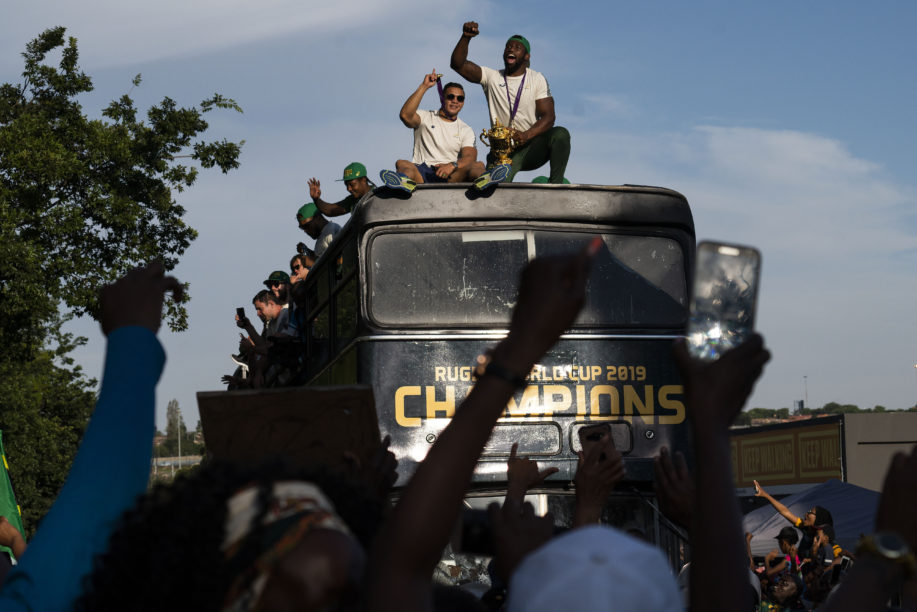There is almost nothing that a child in a rural village in the Eastern Cape has in common with a businessman in Johannesburg—not even a shared language—except that, in the last few days, they might have both shouted themselves hoarse at the arrival home of Siya Kolisi and his team. The scenes of shared jubilation greeting the South African rugby team as they do their victory tour might be unprecedented in the country’s history.
The pleasure of watching rugby is that it looks so much like life. You carry something precious that is inherently hard to clutch. You lose by letting go of it, you lose by hanging on too tightly. The try line is terribly far away, and there is the line of enormous men bearing down upon you. They hang on you. They tackle you down. They pile on, pummel and crush you. How can you possibly get anywhere?
A nation is the product of magical thinking and so the moments that build it must necessarily be incantations.
The word ‘tough’ came up a lot when the Springboks talked about winning games, staying motivated, and the general experience of being South African at the moment. And times have been tough. We have the highest youth unemployment in the world, the worst inequality in the world, and some of the most violent cities, and over the last few years these conditions have actually worsened. More people are jobless, more people are drowning in debt, more people are shot, and more women fall victim to ‘a detonation of psychotic, demented violence’ that leaves the public reeling with the details of their torture.
The Springboks were not the favourites to win the cup, and they lost their first match to the team that was, the All Blacks. By the time they faced England their odds were better, but even then, they were not widely expected to win. But to earn the right to cast the spell, you have to win the match.
Because magic does not fuck around, this victory required human sacrifice. In the first half, the two teams threw themselves so hard at each other they were breathless, broken, knocked out cold, dislocated. By the second half South Africa bore down on England so relentlessly the Roses imploded, and we began to win elegantly. Our team had never scored a try in the final game of a Rugby World Cup before, but in this game the Springboks scored two late tries, and, all of sudden, they made it look easy. Like, you just make a break for it. Like, you just shake your tail feathers.
The incantation proper began in his post-match interview, when Kolisi repeatedly thanked the team’s supporters. He thanked the supporters watching in ‘taverns’ and ‘shebeens’ (a reference to ghettos and poor towns), watching on farms, and those too poor or otherwise desperate to even have a home: “…and homeless people, there were screens there…”
In conventional post-match interviews one hears things like, We put our best foot forward. I’ve heard They really brought their A-game. I’ve heard We did the hard yards. I’ve heard We’ve gave 110%. I’ve heard the boys had a point to prove today. But I’ve never heard a sportsman thank the homeless, a group entirely out of the commercial reach of sport. The homeless will not buy Springbok rugby shirts, they will not buy tickets to games. They will not drink the beer, open the bank accounts, or buy the consumer products of any sponsor. They survive by begging at streetlights, and watching parked cars, and pushing around trolleys filled with scrap metal. They hide under bridges and in sewers so that they are not beaten by the police or pissed on or kicked by drunken passers-by. These South African people, too, Kolisi thanked.
Kolisi was born to a teen mother, who died when he was fifteen. Growing up, he did not have enough to eat. Five years ago, he rescued his two half-siblings from the social welfare system. But he does not present his story as the only one. He held up the circle of citizenship and made sure everyone knew how big it was drawn.
Perhaps no sport should bear the enormous symbolic weight that rugby bears in South Africa. Certainly, it wouldn’t do so now if it had not been blessed by President Mandela, democracy’s patron saint, and I agree, that blessing had its problems. I also know that behind the full expanse of this side’s branding and victory tour there is a PR company getting an enormous bonus, this year. But I am not immune: I am bewitched. When I think of the majesty of Saturday, I think of this, and remember, too, that in a country where 62% of birth certificates do not list a father, Kolisi gave an interview to ITV with his infant daughter on his hip.
Coach Rassie Erasmus said that after their first loss the Springboks felt enormous disappointment and stress, but as they discussed the matter, their perspective changed. They decided that rugby was not “pressure”: ‘pressure in South Africa is not having a job, pressure is one of your close relatives being murdered’. Rugby, they decided, was about ‘hope’. The words of this spell are simple, but not facile. The intellect acknowledges the challenges, the complexity. It takes a deep inhale. The heart burns to make the whole body surge forward. And who can bring us down.
 Jerome Delay/AP
Jerome Delay/APCorrection: an earlier version of this piece incorrectly stated that South Africa had never scored a try in a Rugby World Cup match. We regret the error.





